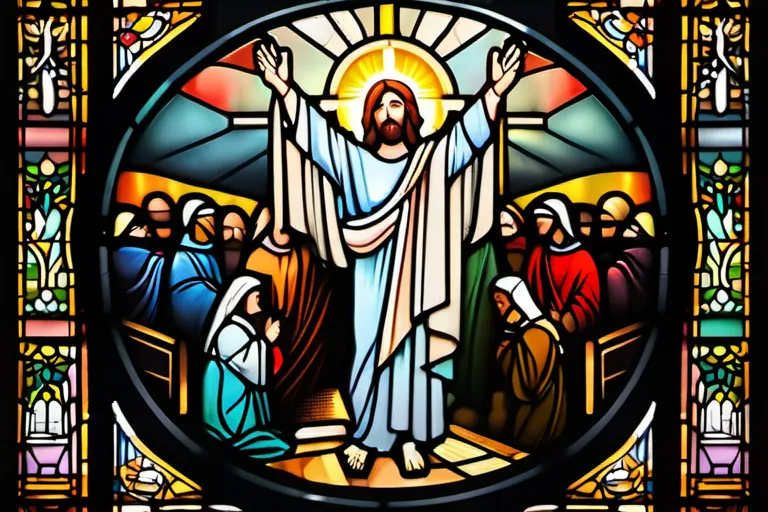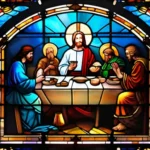Explore the historical, biblical, and cultural significance of Sunday in Christianity.
Sunday holds a special place in Christianity as the day of worship and rest. In this article, we delve into the origins, history, and importance of Sunday in Christian faith.
The Biblical Significance of Sunday
The significance of Sunday in Christianity is rooted deeply in both biblical and historical contexts, often seen as a pivotal shift from the traditional Saturday Sabbath. Did you ever wonder why Christians celebrate Sunday instead of Saturday? Could it be that this change symbolizes a new beginning or a fresh start within the Christian faith?
In the New Testament, we find several references that suggest a transition from the old Sabbath to a new one. For instance, in Mark 1:21, Jesus is found teaching on the Sabbath day in the synagogue. Yet, this event hints at a broader understanding of His mission, which isn’t confined by earthly laws but transcends them.
The early church, too, began to see Sunday as a significant day. Consider the story of Pentecost, described in Acts 2:1-4. Here we find the Holy Spirit descending on the apostles and followers of Jesus on the day of Pentecost, which happened to be on a Sunday. This event could symbolize the new covenant, where believers are filled with the Holy Spirit and given a new life in Christ.
Moreover, the resurrection of Jesus is central to Christian belief. Many argue that His resurrection occurred on the first day of the week, making it the primary day for Christian worship. How can we overlook this connection? If the resurrection is the cornerstone of our faith, then why wouldn’t Sunday be a significant day?
As we delve deeper into these biblical references, one can see how the transition from Saturday to Sunday represents more than just a change in calendar days; it signifies a shift towards a greater understanding of God’s work and the importance of community worship. This new Sabbath, celebrated on Sunday, is not just about rest but about renewal and celebration of God’s victory over sin and death through Jesus Christ.
The Historical Evolution of Sunday Observance
The historical evolution of Sunday observance is a fascinating journey that intertwines religious doctrine, societal customs, and cultural practices. How did the day of Jesus’ resurrection become a central point in Christian life? It’s a story that spans centuries, from the early days of Christianity to its current significance.
Originally, the Jewish Sabbath was observed on Saturday, a tradition rooted in Moses and the Ten Commandments. However, as Christianity spread beyond its Jewish roots, it faced the challenge of adapting to the broader Hellenistic and Roman cultures. Could it have been easier for early Christians to keep the Sabbath unchanged?
The shift towards Sunday observance began with the early Christian communities themselves. The New Testament mentions that Jesus rose from the dead on a day later known as Sunday, marking a pivotal moment in history. Wasn’t Sunday chosen simply because it was the first day of the week, or did it hold deeper theological significance?
Over time, this choice became increasingly important for the Christian community. In the early Church, Sunday services were seen as a celebration not just of resurrection but also of the completion of God’s creation. Could Sundays have become the primary day of worship because they symbolized the beginning of a new era in human history?
The Council of Nicaea in 325 AD played a crucial role in cementing Sunday as a universal practice among Christians. The council recognized that maintaining unity was essential for the spread of Christianity, and standardizing the day of worship helped achieve this. Could it be argued that Sunday observance became a unifying force within the Christian world?
In subsequent centuries, various factors such as political influence, theological debates, and cultural practices further solidified Sunday’s importance in Christian life. By the Middle Ages, Sunday had become deeply ingrained in the lives of Christians, with numerous customs and traditions surrounding it.
From a simple day to commemorate Jesus’ resurrection, Sunday evolved into a complex tapestry of religious, social, and cultural significance. How did this transformation shape the very fabric of Christian societies?
The Cultural Significance of Sunday in Christianity
The Cultural Significance of Sunday in Christianity: Investigate how Sunday has been celebrated and observed within Christian cultures throughout history.
Imagine stepping into a bustling medieval village where every Sunday, the sound of bells ringing fills the air, marking the start of a day filled with tradition and devotion. How did this simple act of ringing bells evolve to become such an integral part of Christian culture? The answer lies in the rich tapestry of cultural practices that have woven themselves around the celebration of Sunday.
From the early days when Christians gathered after the Sabbath (Saturday) for worship, to the elaborate festivals and feasts that emerged during the Middle Ages, Sunday has always been a day set apart. It’s hard not to wonder: how did this simple shift from Saturday to Sunday come about? And what does it say about the values and beliefs of those early Christians?
The transition to Sunday as a day of rest and worship was gradual, influenced by both religious and cultural factors. As Christianity spread across the Roman Empire, it encountered various customs and practices. The Romans celebrated their own festivals on Sundays, and these celebrations eventually blended with Christian traditions.
Consider the significance of this blending: could it be that Sunday became a day of joy and celebration because it marked a new way of life? A life where the faithful were encouraged to reflect, pray, and engage in community activities. Could the change from Sabbath to Sunday symbolize a shift from legalistic observance to spiritual freedom?
Throughout history, different Christian denominations have their unique ways of celebrating Sunday. For instance, in Catholic churches, Sunday masses are often followed by elaborate rituals and processions. Meanwhile, Protestant churches might focus on simpler services that emphasize personal devotion and scripture study. Each tradition adds a layer of cultural significance to the day.
Think about it: why is it that even today, many people still wake up early to attend church or participate in community activities on Sundays? Is it simply because it’s always been done this way, or is there something deeper, something that resonates with our souls?
The cultural significance of Sunday extends beyond religious practices. It has become a time for family gatherings, social events, and community service. In many cultures, Sunday has evolved into a day when people take a break from the week’s routines, allowing themselves to recharge and reconnect.
So, as you reflect on your own Sundays, consider what they mean to you. Do they hold the same weight of tradition and significance that they do in Christian history? Are they a time for rest, reflection, and celebration?
The day of Sunday, once a mere change in the calendar, has become a symbol of hope, faith, and community. It’s a reminder of the enduring power of religious traditions to shape our lives and cultures.
The Role of Sunday in Modern Christian Practices
Imagine stepping into a church on any given Sunday, and you might find yourself surrounded by familiar faces, engaging in prayer, singing hymns, and hearing sermons. But what makes this day so special? Why is Sunday such an integral part of modern Christian practices? It’s more than just a routine; it’s a deeply ingrained tradition that holds profound meaning.
Sunday marks the beginning of a new week for Christians, not only because of its religious significance but also due to its cultural importance. Worship on Sunday often includes elements like Bible study, communion, and fellowship. These gatherings serve as more than just spiritual activities; they are communities coming together for mutual support and growth.
The role of Sunday in contemporary Christian practices is multifaceted. It’s a day dedicated to reflection, where believers can delve into the teachings of Jesus, contemplate their faith, and seek guidance from Scripture. Yet, it’s not just about personal devotion; Sundays also offer opportunities for service—volunteering at shelters, participating in outreach programs, or simply lending a helping hand to those in need.
In many ways, Sunday worship is like the heartbeat of a Christian community. It pulsates with life, echoing through the halls of churches and into homes, reminding believers of their shared mission. Just as a river finds its source, so too does the faith find its nourishment on Sundays.
So, why do Christians continue to gather each Sunday? Could it be that they believe in something greater than themselves, a divine presence that strengthens and guides them through the week ahead? The answer lies not just in the bells ringing at the start of worship but in the connection made during those hours. It’s about finding solace, strength, and purpose in the simple act of coming together.
In essence, Sunday is more than a day; it’s a journey, a reminder that no matter how hectic life may get, there is always a place where one can find peace, fellowship, and the embrace of their community. It’s a day that bridges the gap between heaven and earth, making the abstract concepts of faith tangible and real.
What does Sunday mean to you?
The Theological Significance of Sunday
The theological significance of Sunday as a day of rest and worship is a profound aspect of Christian practice, deeply rooted in both biblical commandments and cultural traditions. Why did early Christians choose to gather on the first day of the week? Was it simply for convenience, or does Sunday hold a special place in the hearts and minds of believers?
According to Acts 20:7, the apostles met together on the first day of the week to break bread. This passage suggests that even early Christian communities recognized the importance of gathering on what we now know as Sunday. But why did they choose this particular day? It wasn’t by accident; it was a conscious decision with deep theological implications.
Some scholars argue that Sunday represents a fulfillment of Exodus 20:8-11, which commands the Jews to remember and keep holy the Sabbath, the seventh day. By observing Sunday instead, early Christians were symbolically breaking the old covenant of law for a new one with grace and freedom in Christ. This transition is often seen as a shift from the physical to the spiritual, from the material constraints of the Law to the boundless love and forgiveness found in Jesus.
The significance of Sunday also lies in its representation of resurrection and new life. Just as God created light on the first day of creation, thus beginning a new era, Christians believe that Christ rose from the dead on the first day of the week, inaugurating a new covenant where eternal life is possible for all who believe.
But beyond these theological nuances, Sunday serves as a practical reminder to believers to take time out from their daily routines. It’s a day set aside not just for worship but also for reflection and renewed purpose. In a world often consumed by materialism and busyness, the observance of Sunday offers a chance to pause, to re-evaluate one’s priorities, and to connect more deeply with both God and community.
So, why do we continue to observe Sunday as a day of rest and worship? Is it merely a tradition passed down through generations, or does it hold an essential truth about the nature of faith and discipleship in Christ?
The Future of Sunday Observance in Christianity
As we look towards the future, one question looms large: how will Sunday observance evolve within Christianity? Will it remain a steadfast tradition, or could there be shifts that reshape how believers spend their Sundays? Historically, Sunday has been synonymous with resurrection and new life, much like the sun itself rises each morning to bring light after darkness. But as societal norms and values continue to change, so too might our understanding of what Sunday means in a modern context.
The challenges are multifaceted. With technological advancements and global connectivity, believers now have access to worship services at any hour. This raises the question: can Sunday still hold its unique place in the weekly cycle when people can connect with faith anytime? Moreover, as work cultures evolve towards more flexible schedules, some may wonder if the traditional Sunday rest is necessary or even practical.
Another consideration is the diversity within Christianity itself. Different denominations and sects might have varying approaches to Sunday observance. How will these differences be reconciled in a future where individuals have more personal freedom in their religious practices? Will there be a push towards uniformity, or will local communities continue to define their own ways of marking this special day?
As we ponder these questions, it’s clear that the significance of Sunday in Christianity is not static. It’s like a river, always flowing and changing, yet still recognizable as the same stream through time. The future of Sunday observance will be shaped by the choices and needs of those who practice their faith, making it an exciting and dynamic chapter in the ongoing story of Christianity.
Conclusion
 By understanding the historical and biblical significance of Sunday, we gain a deeper appreciation for its role in shaping Christian practices and traditions.
By understanding the historical and biblical significance of Sunday, we gain a deeper appreciation for its role in shaping Christian practices and traditions.











